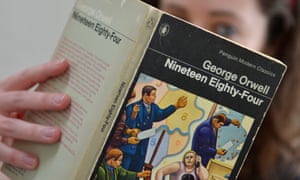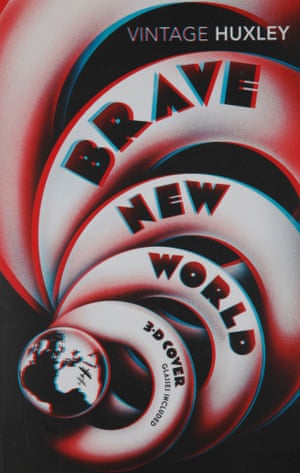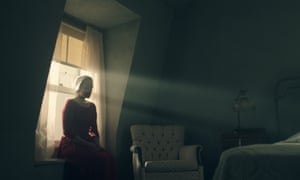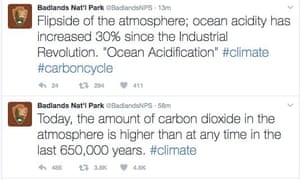The Guardian

Link
Since the inauguration of Donald Trump as president of the United States, George Orwell’s Nineteen Eighty-Four has shot up the bestseller charts. The book’s chilling account of a couple’s struggle against a dystopian society has many elements that will strike a contemporary reader as disturbingly prescient. Orwell’s description of “doublespeak” – the ability, and requirement, to utterly believe two contradictory thoughts at the same time – feels tailor-made for a president who simultaneously believes that three to five million “illegals” voted in the election, and that his victory in that election was completely fair and valid.
Similarly, the Party’s slogan that “Who controls the past controls the future: who controls the present controls the past” seems to chime with the White House’s incorrect claim that Trump won the general election with “the most [electoral votes] since any Republican since Reagan” (he didn’t) or that the crowd on 20 January was the “largest audience to ever witness an inauguration” (it wasn’t).
But Nineteen Eighty-Four is also a book about a particular kind of dystopian state: an authoritarian Stalinist future-Britain, based on the fears Orwell felt most pressing in 1948. Maybe it’s time to find better dystopias?
The Handmaid’s Tale
Margaret Atwood’s 1985 novel is set in a near-future New England following the collapse of America into the authoritarian, theocratic state of Gilead. It was groundbreaking for its treatment of gender, depicting a state in which the advances of feminism have been comprehensively destroyed. Women are considered inferior to men, and their every behaviour is tightly controlled by the state. In particular, their role in reproduction is bound to a strict caste system: abortion is illegal, and fertile women are required to bear children for higher-status women.
On Monday, Trump signed the “global gag order”, barring US funding from going to NGOs who provide abortion services or information. It was one of his very first acts as president.
Brave New World

Aldous Huxley’s 1931 novel is often compared to Nineteen Eighty-Four. Where the latter shows a dystopia that rules through fear and repression, Brave New World shows an iron fist in a velvet glove. The population are kept repressed through standard acts of an authoritarian regime, such as control of the media, but also through being kept too happy to rebel. Soma, an antidepressant hallucinogen, is used by almost everyone to tackle any residual unhappiness, while hypnosis ensures that all members of the society’s caste system are happy and content with their place in society.
Compared to Nineteen Eighty-Four, Brave New World makes the case that an oppressive, authoritarian dystopia can still be pleasant to live in for the vast majority, sparking little mass resistance.
Virtual Light
William Gibson’s novels in the late 80s and early 90s were the defining texts of what has come to be known as cyberpunk. In essence, cyberpunk novels often ask the question: what if we had the technology to solve almost all of the world’s problems, but inequality and capitalism prevent us from doing so? Virtual Light, the first of Gibson’s Bridge trilogy, is set in a sprawling community living on San Francisco’s Bay Bridge following a devastating earthquake. Ever greater concentration of wealth has rendered multinational corporations miniature states in their own right, with private security forces acting like personal armies for the super-rich, while the middle class has almost entirely dissipated.
Trump’s net worth is currently estimated to be about $3.7bn, and he has refused to extricate himself from his businesses in any way that satisfies conventional ethical norms.
The Private Eye
Brian K Vaughan and Marcos Martin created the colourful world of The Private Eye in 2015. Set in Los Angeles in the latter half of this century, it explores a world two generations after the “cloud burst”: a catastrophic collapse of internet security that left everyone’s personal data exposed for all to see. To contain the damage, the internet is never rebuilt, and privacy becomes the new focus of society, over liberty or security. But the world still has to deal with its failures to contain the damage of climate change, and the citizens of LA are only safe from the ravages of the ocean thanks to an enormous coastal wall that keeps the waters out.
On Tuesday, Trump moved to freeze contracts and grants funding researchsupported by the environmental protection agency, and a national park became a focus of resistance by tweeting facts about climate change.
Children of Men
Alfonso Cuarón’s thriller bears little relation to the PD James novel on which it is based, except for the central premise of a world in which no children have been born for decades. Cuarón shows a Britain ruled by an authoritarian regime, the last functioning government in the world, rousing the public in hatred of “fugees” fleeing the chaos in other nations.
Trump’s signature campaign pledge was to build a wall across the US/Mexican border, and force the Mexican government to pay for it through a threatened tax on remittances.



No comments:
Post a Comment